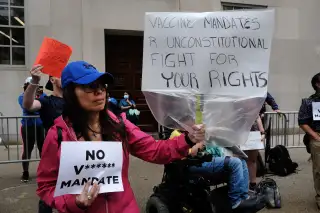What Is OSHA, and Can It Require Workers to Get Vaccinated?

A federal vaccine mandate will soon affect millions of more American workers.
On Thursday, President Joe Biden said the Occupational Safety and Health Administration (OSHA) is developing a rule that will require all employers with more than 100 workers to require their employees get vaccinated or undergo weekly COVID-19 tests. The rule will impact over 80 million private-sector workers, according to an outline of the overall pandemic action plan.
The president also said that all executive branch employees and contractors who work with the federal government will need to be vaccinated, and action is being taken to require workers at most Medicare- or Medicaid-funded health facilities be vaccinated. In July, the president had said federal workers had to get vaccinated or get tested regularly.
There was immediate backlash to the plan, and OSHA likely has its work cut out for it. And there are also plenty of questions people have about what exactly OSHA is and whether or not it can enforce Biden's vaccine mandates.
What is OSHA?
OSHA is a federal agency that was created with the Occupational Safety and Health Act of 1970 to ensure safe and healthy conditions for workers. The act, signed by President Richard Nixon, aimed to ensure that employers provide workers with an environment that is "free from recognized hazards to safety and health, such as exposure to toxic chemicals, excessive noise levels, mechanical dangers, heat or cold stress, or unsanitary conditions," according to the U.S. Environmental Protection Agency's site.
OSHA, which is part of the U.S. Department of Labor, covers most private sector employers and their workers, as well as some public sector employees. The agency has the right to inspect workplaces to ensure that employers are complying with the agency's standards, like blood lead testing for workers exposed to a certain level of lead and providing respiratory protection to those exposed to a certain level of asbestos.
Between 1970, when the agency was created, and 2018, the number of workers who were killed on the job fell from 14,000 per year to about 5,250, all while U.S. employment has more than doubled, according to OSHA and the Bureau of Labor Statistics.
OSHA and Biden's vaccine mandate
Republican lawmakers quickly pushed back on Biden's new requirements. Rep. Chip Roy, R-Texas, tweeted that business should "openly rebel" against the rule while Rep. Dan Crenshaw, R-Texas, called it "insanity." Rep. Madison Cawthorn, R-N.C., simply said, "I'm filing a bill to gut OSHA."
Georgia Governor Brian Kemp called the move a "blatantly unlawful overreach by the Biden administration" and said he would "pursue every legal option available to the state of Georgia" to stop it shortly after Biden's announcement.
Is Biden's vaccine mandate an overreach? Not according to experts. Robert I. Field, a law professor at Drexel University, told The New York Times that OSHA had the authority to protect workers safety by requiring vaccinations and Lawrence O. Gostin, a Georgetown University law professor who specializes in public health told the Times that while the plan is "bold, audacious and unprecedented," it's also "entirely lawful."
It's also not the first time the agency has used its power to protect against the virus. Back in June, for example, OSHA made a rule that health care employers had to provide employees with protective equipment like masks, ensure proper distancing and ventilation and give workers paid time off to get vaccinated and manage their symptoms. The agency has also required some workers to wear respirators to prevent disease and death in the workplace for years with the Respiratory Protection Standard.
Still, we're likely to see court battles over the new requirements. Companies that don't comply could see fines of nearly $14,000 per violation, Reuters and others have reported.
David Michaels, a former head of OSHA, provided his prediction on how the agency may enforce these rules via Twitter. He said that "compliance generally starts to happen when the rule is announced, even before it goes into effect." Workers can also complain to OSHA if their employer doesn't comply, and the agency "can inspect and issue a fine, often accompanied by a press release."
More from Money:
CVS, Walgreens and 5 Other Companies Increasing Pay to $15 an Hour — or Higher
40% of Workers Say They'd Quit or Look for a New Job if Forced to Return to the Office Full Time
Will There Be a Fourth Stimulus Check Just for Older Americans?